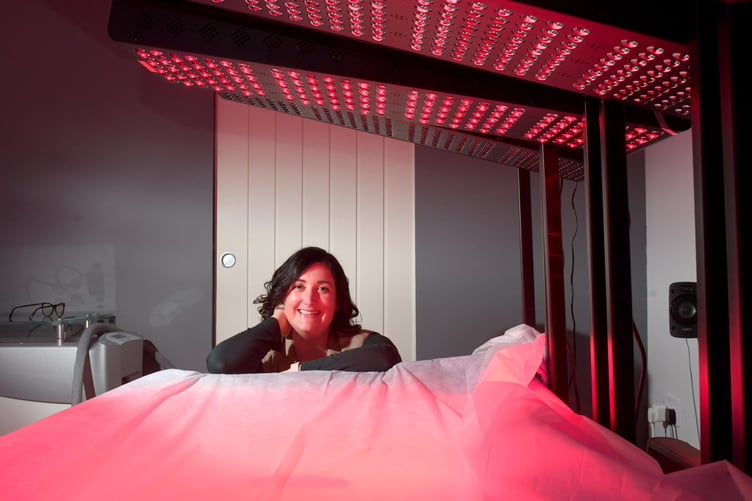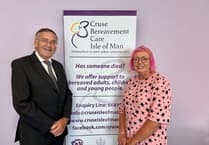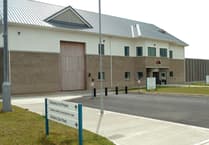Think of your typical day. You are eating breakfast while your partner or children are reminding you of what they have on that day, messages are coming in on your phone and the dog is jumping up and down wanting to go for a walk.
You go to meetings at work with members of your team all reporting and updating and you answer maybe 50 or 100 emails before you get home, read the newspapers online and scroll through the hundreds of programmes Netflix have on offer.
This is not an exceptional day in anyone’s life and, if you think about it, it’s quite an assault on your senses. ‘Sensory overload’ is how Amy Abid describes it.
She says: ‘Think about all the things that are hitting our brains these days and each one of them can activate the fight or flight response.’
That fight-or-flight response causes a release of hormones including adrenaline which makes your heart rate speed up, increasing oxygen flow to your major muscles. Your pain perception drops, and your hearing sharpens.
Another hormone, cortisol, helps you to maintain that fight or flight response by increasing blood sugar levels and releasing fat stores, providing the energy to deal with the threat.
This isn’t a conscious decision, it’s an automatic reaction which you can’t control. And whilst these responses, which prime us to run away from a potential predator, were very useful in the days when we roamed the prehistoric plains with all sorts of dangerous creatures, in our more sedentary world it does us no good at all. Being constantly in a state of fight-or-flight can be very harmful to your health.
‘Your brain hasn’t got the memo that we don’t need all those hormones. That happens thousands of times a day to all of us and it is all a lot more preventable than we are led to believe by the prescription-led medical service,’ says Amy.
She and her husband, Dr Kamran Abid, have just launched a business, Therafloat, based at The Nunnery, which aims to deal with the emotional and physical fallout from all this in our bodies.
But this is no woolly wellness initiative, this is rooted in science.
Amy is a former Comba medical technician in the army who later became a neuroscience specialist nurse and worked as a sister in one of the UK’s busiest regional neurosurgical trauma centres, at Sheffield’s Royal Hallamshire Hospital. Kamran spent most of his career as a brain surgeon with a special interest in researching brain inflammation. He was an honorary lecturer at Manchester University.
More recently he retrained as a psychiatrist and now runs the crisis team at Noble’s Hospital, dealing with mental health crises including suicides, psychotic episodes, and patients intent on harming themselves or others.
Amy says: ‘Our entire lives have been dedicated to the brain and helping people.’
Their move to the island coincided with her father dying and some serious complications with her pregnancy before her son was finally born, thankfully completely healthy.
Amy recalls: ‘‘We came here and it just hit me. I had a complete mental breakdown. It was the most terrifying experience I’ve ever had.
‘I was offered the standard drug treatments and I kept saying to Kamran: “How awful that there is nothing else on offer. Why isn’t there something alternative, but bound in science and absolutely proven to work in physical and mental health?”
‘So I decided that I was going to invent it. And that’s exactly what we’ve done.’ Their solution is to ‘stack’ several therapies to combat stress related inflammation.
Amy says: ‘Inflammation it is very big at the moment and we’ve known it has been for a long time. It is at the root of every known disease.’
The treatment begins with local cryotherapy, which uses extreme cold, applied over the spine and the back of the neck, to stimulate the vagus nerve to help you relax.
This is followed by Photobiomodulation (PBM), which looks like infra-red light, to reduce inflammation, promote regeneration and enhance immune resilience. PBM triggers photochemical changes in the body in the same way photosynthesis affects plants.
This is delivered by a bank of lights over a bed you lie on or specifically to the brain via a helmet that you wear.
This latter is called transcranial PBM because the light pulses penetrate the brain. Interestingly, it is showing promise in helping people with addictions and photosensitive epilepsy and also in slowing the progress of dementia.
Amy says: ‘This is going to become a huge thing in the world if it is clinically proven to halt or improve the symptoms of dementia. If you can catch people at an early stage it can hugely influence the progression of the disease.
‘Anxiety and depression, MS and Parkinson’s can all be managed using this, when used alongside a patient’s current medical care and medication – we are not suggesting that people stop those.’
And she adds: ‘We also have some of the corporate people popping in to use the helmet for 10 minutes, to get them ready for a big presentation.’
After the PBM comes the ‘wow’ moment in the treatment as what appears to be the large plastic bag you are lying on starts to inflate, slowly lifting you off the bed so that you are ‘floating’ but without water.
‘The lights go out and you drift away. I spent what I thought was about five minutes in this state but which actually turned out to be 20 minutes.
‘Your brain has no point of reference to calculate the amount of time passing,’ says Amy.
She adds: ‘The effect of the floating is to put you in a theta brain state, similar to that achieved by Tibetan monks who meditate for long periods, and it’s very healing.
‘Often these people donate their brains after death and 70-year-olds are found to have 40-year-old brains.’
Depending on the patient and their specific problem these therapies can also be combined with psychotherapy in the form of solutions focussed therapy.
Amy and Kamran have self-funded Therafloat: ‘Kamran worked extra hours and we juggled childcare to get it off the ground. It is completely our own business,’ says Amy.
For the future, they plan to grow the business through possible franchising deals in the UK.
Amy says: ‘There is no other place in the world that is doing what we are doing: this will be in every hospital at some point.
‘It’s just brilliant.’


-(1).jpeg?width=209&height=140&crop=209:145,smart&quality=75)


Comments
This article has no comments yet. Be the first to leave a comment.